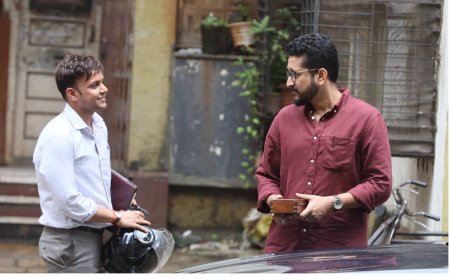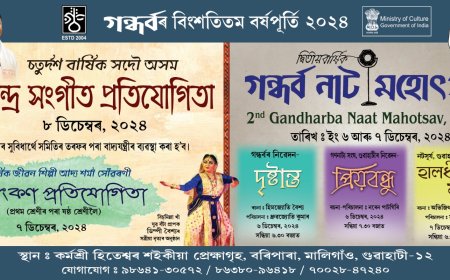Arun Lochan Das, who brought people into the limelight
Renowned film critic, Prantik Deka, pens an insightful discourse on the demise of the esteemed Arun Lochan Das.
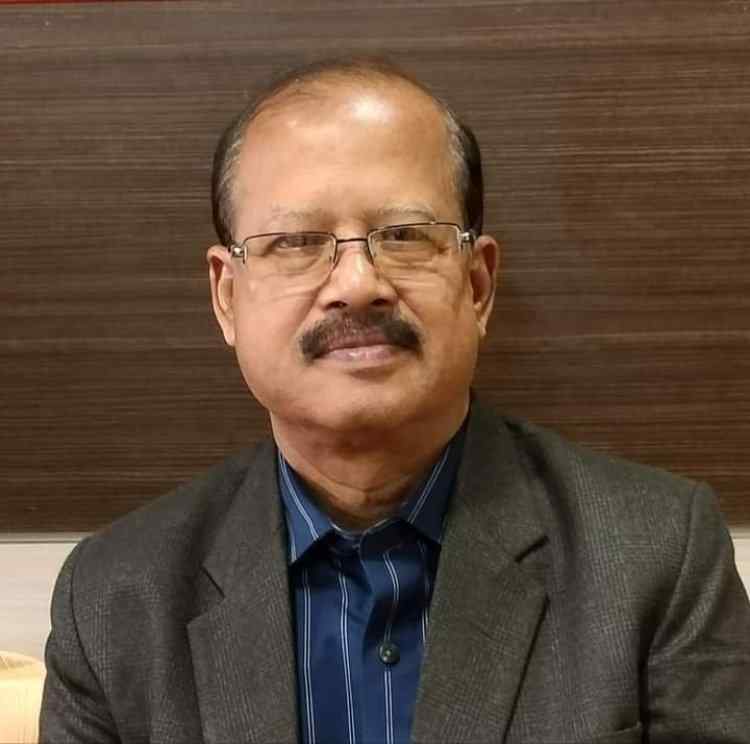
The news of the passing away of our beloved Arun Lochan Das, a leading critic and senior cultural journalist of the state, has left a deep sense of shock. Like everyone else in the cultural fraternity, I'd wholeheartedly hoped that he would soon recover and come back to us. But that was not to be. He left all of us in mourning.
In a career that had spanned almost 47 years in the field of cultural journalism, Arun Lochan Das became one of the most prolific cultural journalists, amassing an amazing number of news articles and essays, which were regularly published in various newspapers, magazines, journals and anthologies. He has authored a number of invaluable books on Assamese cinema. He was one of those very few cine-journalists in the state, who enjoyed a lot of esteem and attention, at least, after the region's most influential film critic and progressive writer, my father Pabitra Kumar Deka. In fact, it was my father's prolific writings and tireless work in the field of film criticism and cultural journalism that inspired and transformed a band of young writers, including Arun Lochan Das, a film enthusiast with a strong creative streak, who staunchly followed his footsteps. During his lifetime, my father and his publication 'Roopkar' (which does not exist anymore) had been repositories of information on cinema in Assamese as well as other ethnic languages of the state.
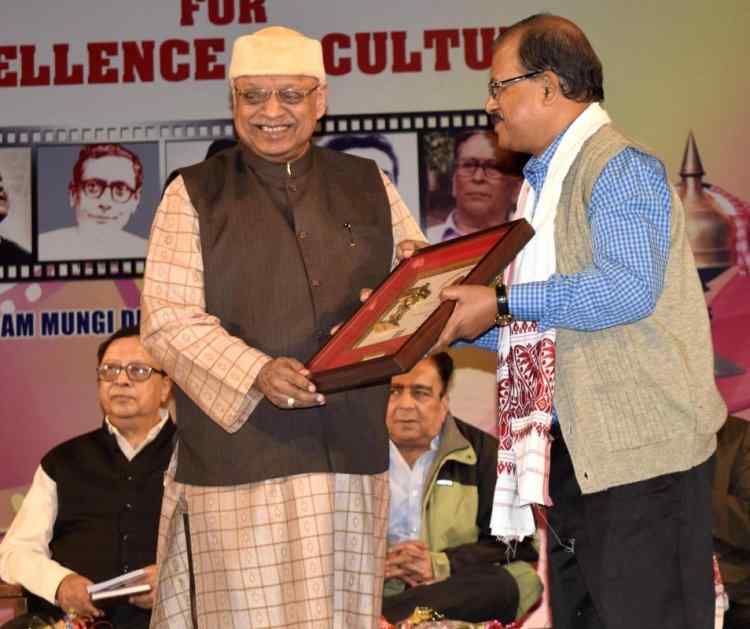
Das, who started his journalistic career in 1976 with the Aarti Das Bairagi edited 'Jonbiri' magazine, was involved in the editing of 'Avakash', the first film magazine to be printed in multi-coloured offset, published in 1979.
In the same year, at the age of 25 years, Arun Lochan Das had the privilege of working closely with my father after joining the immensely popular and progressive 'Roopkar' magazine in 1979 as a cultural reporter. His elder brother Kamal Lochan Das was already working as a photo-journalist and cultural reporter for 'Roopkar' in addition to other magazine publications since the mid-70s. So quite naturally, Arun Lochan Das was inspired to follow suit.
It was from that point on, Das was consumed by cultural journalism, seriously learning, honing, gathering and perfecting his craft to the best of his ability. Consequently, his association with 'Roopkar' broadened his horizons, and changed his career arc. Pabitra Kumar Deka's passion and influence for culture is well-known. It was mostly due to his efforts and initiative that film journalism gained professional status in Assam. And much like my father, Arunlochan Das, too, generously shared his vast knowledge with everyone during his lifetime, and encouraged many aspiring and talented artistes.
For two years from 1990 to 1992, Das also served as an associate editor of 'Chitra Sangbad', Northeast India's first newspaper on cinema and culture. He regularly penned columns dedicated to cinema and culture for leading Assamese dailies like 'Dainik Assam' and 'Asom Bani', which have always attracted critical interest from the general public.
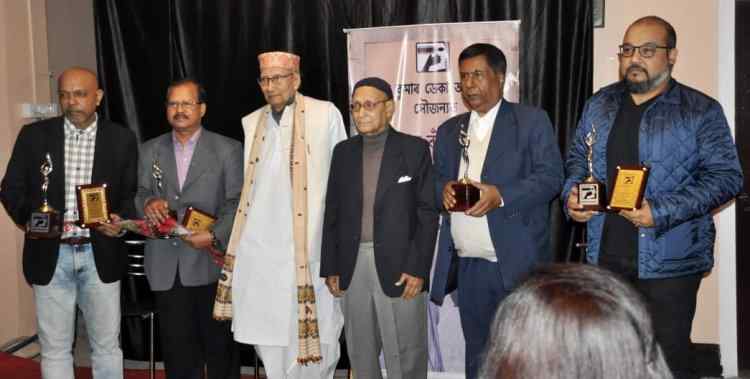
In the fall of 1996, Arun Lochan Das finally realised his long-standing dream when the first film directory of the Northeast – ‘Limelight Film Directory’, was formally released by renowned artist Biju Phukan in a function held at the office premises of ‘Roopkar’ in Pub Sarania, Guwahati. In the meantime, he was busy publicising cultural matters at almost all the major newspapers and magazines through 'Limelight', which existed since 1979. The event also consequently marked the launch of the noted publishing banner Sishu-Sashi Prakashan, dedicated to the memory of Arun Lochan Das’ parents. "We have our own appropriate addresses now," eminent artiste Indra Bania then told during his speech in the function, which was presided over by the Principal of North Gauhati College and noted litterateur, Dr Bhrigu Mohan Goswami.
Since its inception, the much in demand directory, edited and compiled by Das, with his single minded effort and dedication, became an indispensable reference guide for everyone in the cultural fraternity. Besides carrying the names, addresses and contact numbers of artistes and technicians from Assam and the Bollywood film industry, the directory threw particular spotlight on the evergreen Assamese movies, taking readers through interesting and insightful stories behind their makings, related plot summaries, excerpts from screenplays, views and comments from artistes and technicians involved, rare stills from the movies concerned, the lyrics of popular hits, short biographical sketches, obituaries of eminent artistes, writers, cine-journalists and technicians, complete lists of censored and released movies since the first Assamese film 'Joymoti', informations on those which have brought laurels to the state, among other pertinent things.
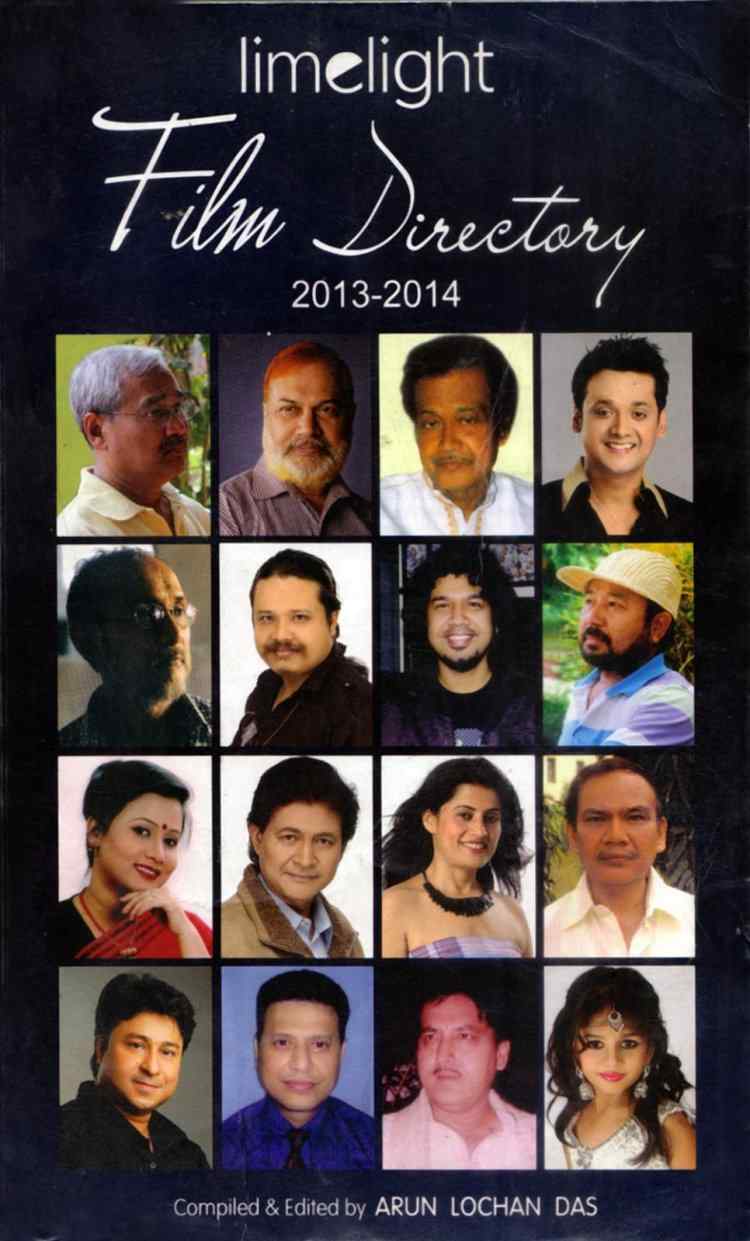
Arun Lochan Das' books on various cinematic subjects of Assamese cinema reflect his great depth of knowledge, accumulated through experience gathered over the years, and painstaking research. His works, which are tireless endeavours, have become a proud possession of filmmakers, researchers, enthusiasts and common audiences. His most notable works include 'Exo Oxomiya Chalaschitrar Kahini Aru Geet : Athsottor Bosoriya Itihaasor Ek Rengoni', which was published in two volumes, 'Shooting Report', 'Eri Aha Dinborot Asomiya Cinema', 'Ki Naam Di Matim', 'Asomiya Chalaschitra' (1935-1991), 'Asomiya Cinemar Kotha', and 'Axomor Xuwodi Xuriya Geet'. For his book on cinema – 'Eri Aha Dinborot Asomiya Cinema', Arun Lochan Das bagged the much deserved 'Special Jury Award' at the 7th State Film Awards for the year 2016-17, in the category of Best Film Critic and Best Book on Cinema, instituted in the memory of influential film critic and cine-journalist Pabitra Kumar Deka, who has been his mentor and guru. The award consisted of a memento, a certificate and Rs 25,000.00 in cash. 'Eri Aha Dinborot Asomiya Cinema' is a reliable guide to the feature films produced in the last eight decades of Assamese cinema, from 1935 to 2017. The two-part voluminous 'Exo Oxomiya Chalaschitrar Kahini Aru Geet : Athsottor Bosoriya Itihaasor Ek Rengoni' provides an overview of a broad range of Assamese films and their historical backdrop, beginning with the first ever Assamese movie 'Joymoti' (1935) to 'Bandhoon' in 2012, accompanied by numerous and rare photographs, along with their stories and lyrics, including ‘Badan Borphukan’, ‘Parghat’, ‘Biplabi’, ‘Chameli Memsahab’, ‘Kollul’, ‘Kolahol’, ‘Sarathi’, ‘Drishti’, ‘Bonoriya Phool’, Maram Trishna, ‘Xagoroloi Bohudoor’, ‘Baibhav’, ‘Othello’, Hiya Diya Niya’, ‘Ghar Sanchar’, ‘Shringkal’, ‘Dinabandhu, ‘Shrimati ‘Mahimamayee’, ‘Arohi’, ‘Village Rockstars’, etc. Brought out on the occasion of 100 years of Indian cinema, the book was published by Jonali Das on behalf of Sishu-Sashi Prakashan.
His travelogue 'Windmill Aru Tulip Phoolor Deshot' garnered immense praise and appreciation from the reading public.
It wasn't easy eking out a living as a freelancer writing for newspapers and magazines, which is still a reality in Assam, but Das supported himself and his family by continuing with his freelance journalism, undaunted by the challenges. After thinking really hard in the beginning about whether he could survive as a freelancer, he went on to make immense strides in a field that he loved dearly. I was a witness to all different phases of his life. It has to be mentioned that he worked as a publicity consultant in over 100 Assamese films and films made in tribal languages, under the banner of Limelight. In fact, he was actively involved in the field of cultural journalism till his death. He showed a lot of tenacity and persistence in his pursuit of facts and information that really helped him to illuminate a news article or a story, whether it's about Assamese movies, celebrities or cultural events, and faithfully disseminating it to the discerning public. He was a most sought-after source for any kind of information on cinema and culture for writers, journalists, academicians and enthusiasts.
In 2016, Arun Lochan Das was honoured with the Jeewan Ram Mungi Devi Goenka Memorial Lifetime Achievement Award for his contributions to culture and literature. The award was presented by eminent producer-director of Marathi cinema, Kiran V Shantaram. Arunlochan Das also received the Roopkar Award for his contributions as a film journalist for the year 2014.
Born on May 29, 1954, in Uzan Bazar, Guwahati, Arun Lochan Das has left behind a repository of a priceless collection of books, photographs, posters, leaflets among other things on cinema and culture, which he had diligently archived and documented, and which needs serious conservation effort.
A down-to-earth, soft-spoken and humble personality, he was a well-wisher for life. I will miss him and his regular calls. He will always be remembered by the cultural fraternity for his dedicated contribution to film and cine-journalism in Assam.
At the time of his death, the late Das is survived by his wife Jonali Das, a daughter and son-in-law.
***
What's Your Reaction?







